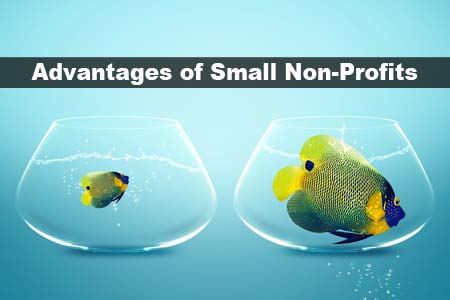Small but powerful isn’t a statement often associated with nonprofits. Bigger, better known organizations have obvious advantages over their smaller counterparts. Does this mean that small nonprofits can never be powerful agents for change?
Not at all. So, what advantages do small non-profits have over large non-profits?
Who You Callin’ Small?
What do we mean by the term “small nonprofit” when no standardized scale to measure nonprofit size exists? We’re going with the definitions used by the IRS, where 501(c)(3) organizations are classified by size of total assets, with cutoffs at $100K, $500K, $1M, $10M, $50M, and greater than $50M. Using these standards, small nonprofits are those having total assets of $500K or less.
These small but vital organizations provide critical services to our communities such as food banks, domestic violence shelters, animal shelters, schools, youth and senior groups. It is estimated that three-quarters of American nonprofits have budgets under $1 million but there are many that are even smaller.
Even though huge international organizations like the Red Cross or United Way regularly make the news and attract massive donations, the bulk of the world’s registered charities are also made up by small nonprofits.
Advantages of Small Nonprofits
There are drawbacks to being small but there are also significant advantages. Smaller nonprofits start out with a store of assets like goodwill, optimism, and commitment. Your group may struggle in the early stages while developing workable resources and systems but as a small organization, you have some key advantages inaccessible to big nonprofits.
- Play by your own rules
When you are small, you own the goalposts and set the rules. Embrace change; agility is a key asset of your size. This is one of the rewards that come with being smaller and less recognized.
A small nonprofit is not going to win by competing with the big boys for brand recognition or initiating expensive marketing campaigns. Your nonprofit is unique! You can be different, focusing on the new ideas that big established organizations won’t risk.
- Small nonprofits are nimble
A major asset in today’s nonprofit environment is the ability to be flexible. Want to try a different fundraising strategy? With minimal obstacles, you can put a new hack in place to improve your fundraising efforts within hours, not weeks.
Similarly, you can test new systems. Being small means you can easily pivot and try something else when you aren’t getting the results you want.
Big nonprofits aren’t known for being quick and agile. With all the checks and balances that come with size, a large organization is often afraid to try a dicey and untried approach in the first place.
- Fewer layers of bureaucracy
There are distinct advantages to not having the highly bureaucratic management structure that large organizations need to function. In the small nonprofit, decision making is quicker and necessary changes can be put in place quickly.
With less organizational structure, internal communications are strengthened and an open-door policy is easier to implement. Small nonprofits are also more cost effective. Charities with many layers of management are much more expensive to operate.
Transparency can be cultivated from the onset. Many larger organizations won’t run the risk of being open. You can talk about the challenges your nonprofit faces – the real story – the biggest, most inspiring blockbuster your organization has!
- Charisma
Personality, personality, personality! Therein lies your organization’s greatest strength. By the very nature of your size, your small nonprofit can’t be objective, professional and impersonal like the big guys.
Enormous nonprofit organizations would give anything for a warm, personal human presence. The face of your organization becomes the small, but dedicated, core of people overwhelmingly committed to your mission.
- Rooted in the community
Big nonprofits can never be small and local. Headquarters can be half a continent away from the beneficiaries, volunteers and supporters that are the reason the organization exists in the first place
Small nonprofits target singular demographic groups and specific community problems, and fill in gaps in available social services. These smaller, local organizations are solving community problems that large charities can never reach and chances are that you will personally get to know your nonprofit’s donors, volunteers, and service recipients.
- Immediacy
Proximity to your constituents means you are better able to serve them. Big-box charities often aren’t equipped to deal with cultural or traditional community problems that local, small nonprofits are likely to be familiar with.
In times of serious need or disaster, large organizations need smaller local nonprofits to act as their hands and feet. These smaller organizations are there, on-the-ground, and can function as reliable service providers in catastrophic situations.
- Small nonprofits are great places to work
Nonprofit professionals can find fulfilling career opportunities in smaller organizations. The smaller, relatively flat organizational structure means you are usually working alongside leadership. In this type of environment, personal career growth can be fast-tracked.
In smaller organizations, communication is better with fewer levels of management to negotiate and schedules are often more flexible to allow for better work-life balance.
All new nonprofits begin as small organizations even if they are destined for massive expansion. Some will grow into gigantic charities; some by the very nature of their missions will stay small. Acknowledge the advantages of your size, face the hurdles head-on and make “Small but Powerful” your mantra.

